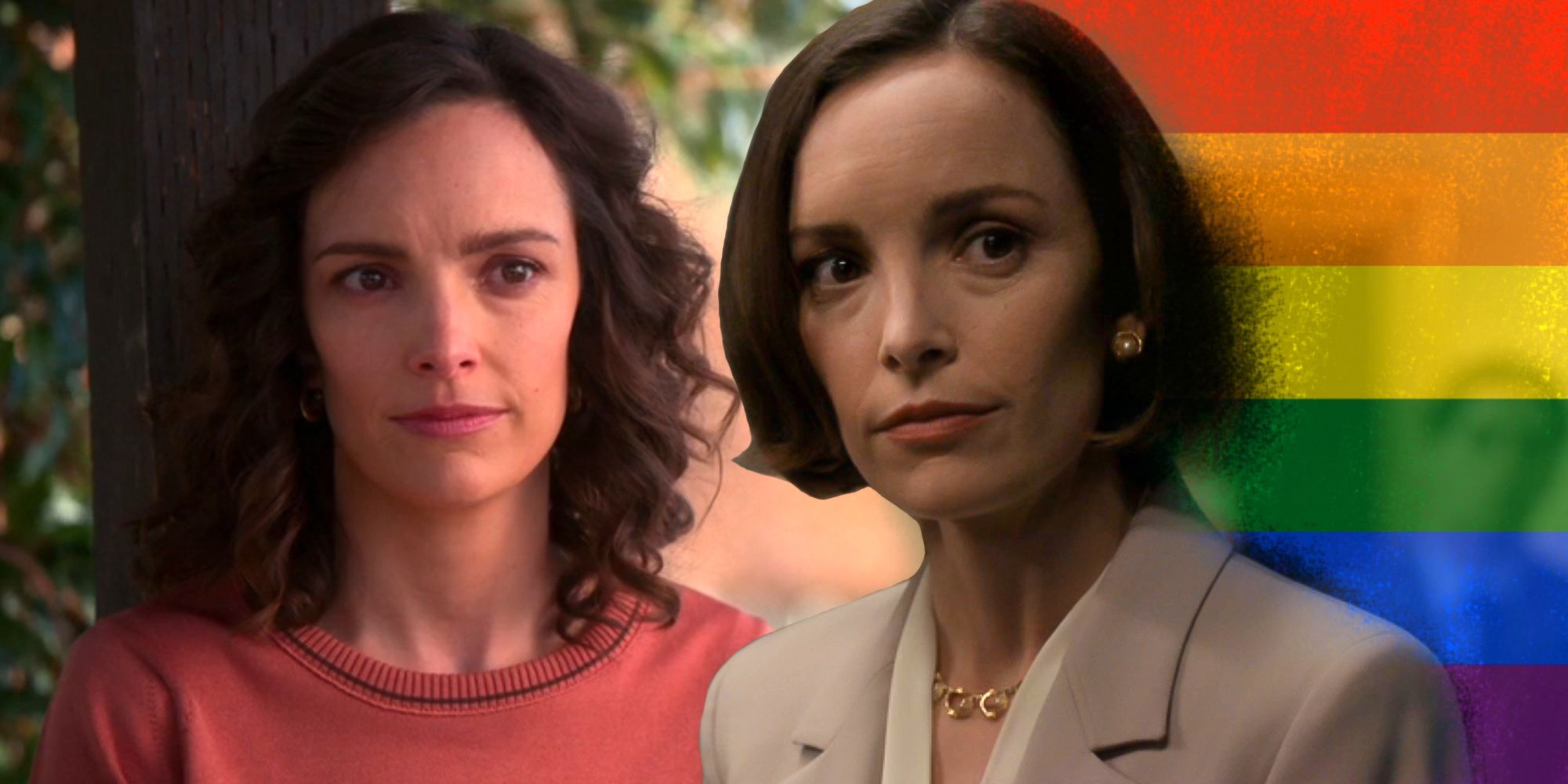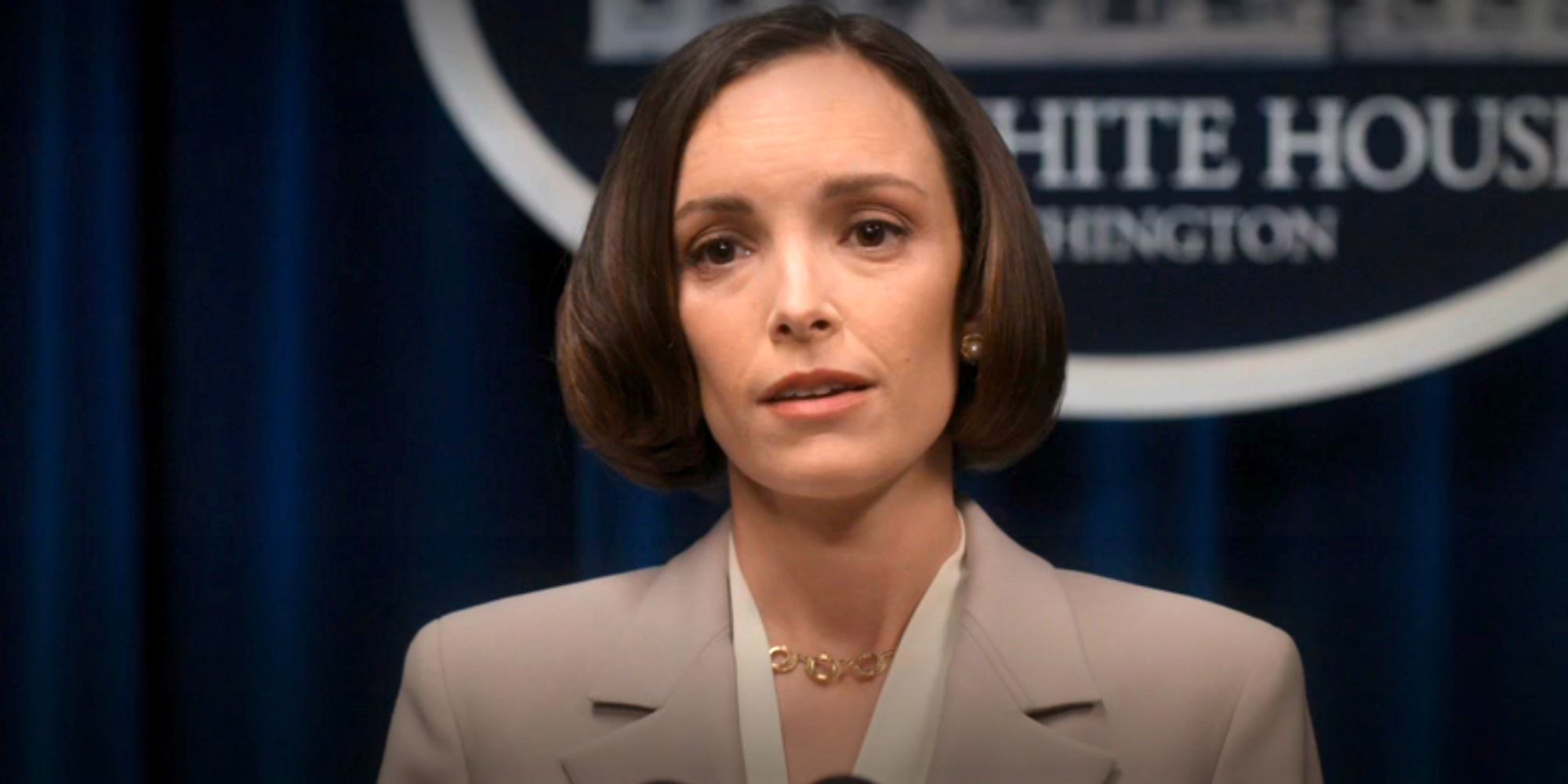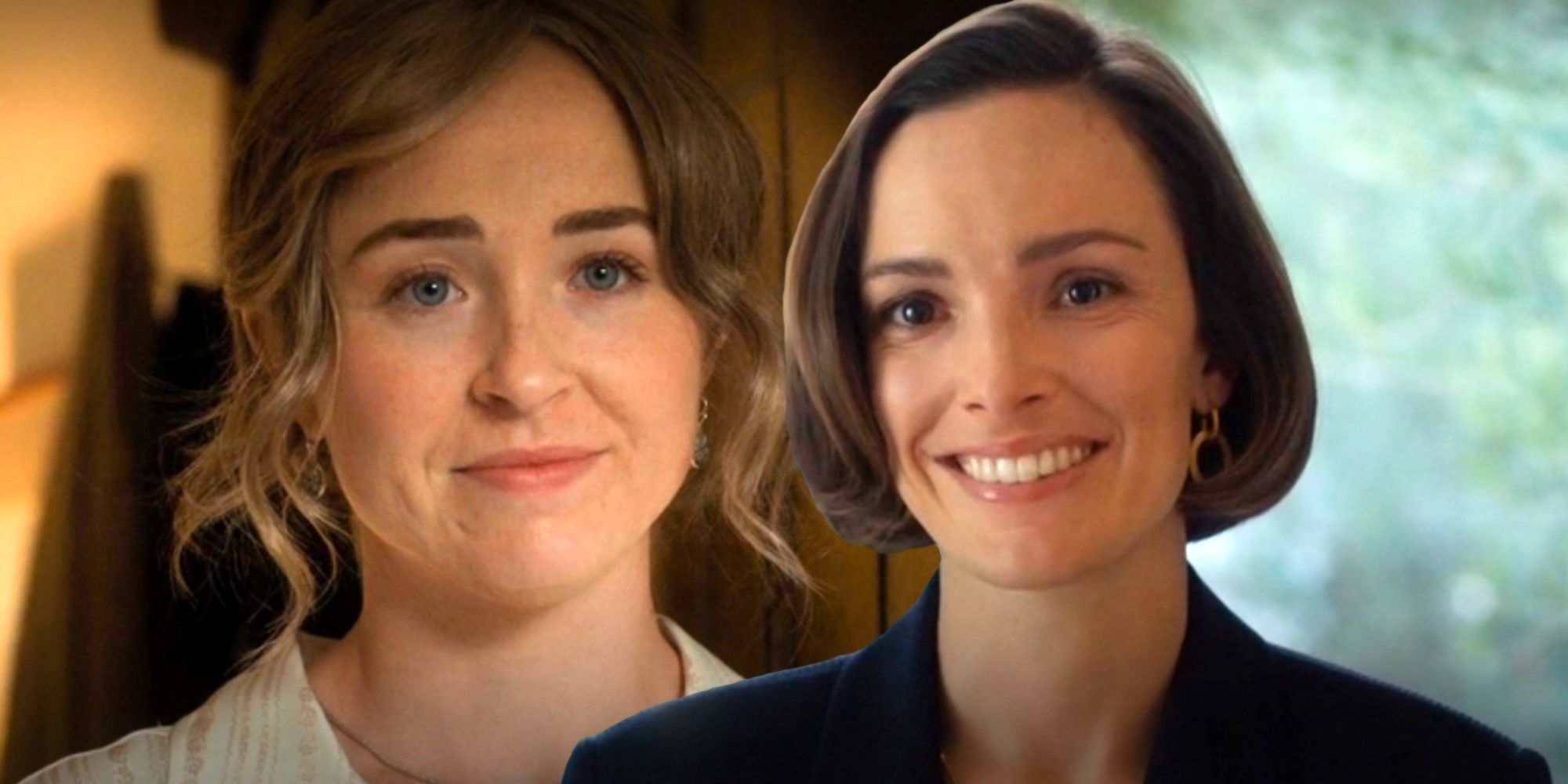Ellen Wilson's arc in For All Mankind holds great significance beyond its role in the Apple TV+ series' narrative. Jodi Balfour's character undergoes sweeping growth comprised of both professional triumph and personal hardship over the show's three-decade-long story. Following Ellen's challenging journey of accepting her sexuality, For All Mankind season 3 beautifully culminates her personal strife by allowing her to realize her full potential as a leader and a human being.
Introduced in For All Mankind season 1 as Ellen Waverly, Balfour's character became one of four female astronauts to complete NASA training - eventually traveling to the Moon on Apollo 19, then later being selected to command the Apollo 24 mission. As she rose to prominence in NASA, she secretly dated Pam Horton (Meghan Leathers), the Outpost's bartender. Unable to live openly as a lesbian, she married her friend Larry Wilson (Nate Corddry) when the FBI grew suspicious of the pair. After commanding NASA's Jamestown base on the Moon, Waverly became acting Administrator of America's space agency before turning to politics, which saw her run a successful campaign for U.S. Senate of Texas and win the 1992 presidential election.
As the promise of her career as a public figure cost Ellen the love of her life and the ability to live an authentic lifestyle, she reaches her breaking point in For All Mankind season 3 when she publicly comes out as gay in episode 9. Ellen’s arc in For All Mankind isn’t just brilliantly developed and paid off through three seasons, but it’s also orchestrated in a way that authentically reflects the realities of past decades for women and LGBTQ+ people on both an intimate and global scale. By intertwining the personal and professional sides of Ellen’s story, the series presents a powerful, highly relevant character arc, which makes its culmination in season 3 all the more meaningful in the grand scheme of both the TV landscape and the real world.
How For All Mankind Season 3 Perfectly Culminates Ellen’s Arc
Through nearly three entire seasons of For All Mankind, Ellen fights an internal battle between her true self and the version of herself others believe her to be. She leads a double life from her early days at NASA to fulfill the promise of her career as an astronaut and, eventually, as a politician. Sacrificing her own well-being for the wishes of those around her, Ellen finds herself living on terms other than her own for nearly 30 years. This conflict resurfaces in For All Mankind season 3 when in episode 6, Will Tyler (Robert Bailey Jr.) — a NASA astronaut belonging to Sojourner 1's crew — publicly comes out as gay from the surface of Mars. Driven to tears while watching his statement alone in the Oval Office, Ellen is forced to confront her passiveness as the leader of a nation where an openly gay individual like Tyler cannot serve in the military. Tyler's courage shines a light on Ellen's enduring inability to outwardly embrace herself, while her outpouring of emotion evidences the huge toll concealing her identity has taken on her, which no amount of professional success could heal. Ellen's heart-wrenching conversation with Pam in For All Mankind episode 8 colossally impacts Ellen, as the love of her life spares her no sympathy and confronts her inaction toward the LGBTQ+ community. Larry and Pam — the two people closest to Ellen — have long pushed her in opposite directions, and after having heeded Larry's advice beforehand, season 3 represents the occasion when Ellen finally chooses Pam.
After three decades of sacrificing her inner peace for professional advancement, Ellen finally liberates herself by announcing she is gay in an unanticipated presidential press conference — a moment For All Mankind has built toward since Ellen first came out to Deke Slayton (Chris Bauer) to his displeasure in season 1's finale. In an interview with Screen Rant, Balfour reflected on her character: "Could there be a more bendy arc? There’s been a lot of bopping and weaving, but there’s also been a lot of slow ushering toward this moment — very much led by her own agency, of course, but things don’t happen in a vacuum. We look back to that conversation with Deke in season 1 and how crestfallen Ellen is afterward and just what an impact that has on her. We sort of see her do exactly what he suggests she does for a very long time." In this way, For All Mankind expertly pays off Ellen's lifelong journey toward fully embracing her sexuality, as the moment represents the character "coming home" to herself, as the episode's title suggests. "It’s been a slow and steady trudge toward this moment," Balfour added. "The amount of relief I think the character feels, and certainly I feel, that she has reached this point is a lot."
For All Mankind’s Authentic Illustration of Ellen’s Character
Ellen’s arc embodies the idea that “the personal is political,” which describes how one's individual hardships reflect larger systems of oppression. As a gay woman in the 1970s, 80s, and 90s, Ellen's experience of hiding her identity for her own safety and prosperity epitomizes society’s marginalization of the LGBTQ+ community during that time. Principally highlighted by the tug of war between her personal and professional lives, Ellen's story accurately illustrates the eras in which For All Mankind takes place, though it's also relevant to today's world. The authenticity of Ellen's journey lies in the mask she wears and the dual lives she leads. At no point in history have gay people been able to express themselves as such anywhere, anytime, without fear. In Ellen's case, she can only be her true self in private with Larry and Pam. The choices Ellen makes to impact the world's perception of her as a public figure define, in the most explicit manner, a concept that is still a reality for many gay people today.
Stories of LGBTQ+ hardship are far from uncommon in TV, but Ellen's serves a fitting purpose in For All Mankind's alternate history, which additionally explores the realities of gender and race-based oppression. Most importantly, the existence of a light at the end of the tunnel for Ellen enables her story to transcend the often limited scope of LGBTQ+ experiences in TV. "I think to show queer folks in moments of joy, too, and moments of self-actualization, and celebration of themselves is really, really important — not just the struggle always, you know? Balfour said. Although, that’s obviously a fundamental part of so many stories."
The Importance Of Ellen’s Coming-Out Scene
Ellen's coming-out speech brilliantly culminates her journey because For All Mankind affords Ellen the agency to finally take control of her life without being forced into revealing her sexuality or outed by someone else. Particularly in season 2, Ellen had expressed her readiness to come out as gay, though Pam's departure ensured that Ellen stayed silent regarding her sexuality for another decade. For All Mankind season 3 grants Ellen the occasion to tell the world who she is without fear, which underlines her character's growth and journey over a fictional 30-year period. Even though the press conference initially enables Larry to own his mistake, according to Balfour, Ellen realizes that "the more important thing to happen is for her to fully own who she is." On a larger scale, For All Mankind’s depiction of a sitting president coming out as gay symbolizes the moment a gay person owns their identity to a point where they can live openly and unapologetically. Ellen's speech remains a monument of gay visibility and self-governance, and the slow-burn arc preceding the occasion amplifies it even more.
Ellen's address stands as For All Mankind's third coming-out scene, yet also represents just the first one on Earth. The fact that Will and Ellen previously felt safer disclosing their sexuality while off-planet speaks volumes about the way the world treats openly gay people, but more importantly, Ellen's coming out as arguably the most powerful person in the world, in the most public of fashions, is an infinitely powerful statement. Of course, Ellen's speech does not eradicate homophobia from the face of the Earth in For All Mankind, but her individual action, along with her executive order allowing all openly gay people to serve in the military, demonstrates how real progress is set in motion. Ellen had spent her entire presidential tenure compromising and settling for "what's possible" when all along, she realized she could inspire and enact the advancement of LGBTQ+ rights.
Ellen's moment of self-actualization remains For All Mankind's most monumental scene, though its significance extends beyond the series' narrative. Balfour reflected, "I’m pretty confident that this will be one of the most important things I ever got to do as an actor because I don’t know that we’ve seen much of this on television, and for her to come out in the way she does come out, for her to get that moment and really take that moment, it was really, really meaningful to me."
Why For All Mankind Season 4 Is Crucial For Ellen’s Story
While, in many ways, For All Mankind season 3 served as the culmination of Ellen’s arc, the character’s future is just as important as her preceding journey. After reuniting Ellen with Pam in season 3's finale, For All Mankind must continue the pair's narrative and allow Ellen to exist as an out lesbian leading a life on her own terms. Abandoning Ellen's story following season 3 implies that a gay individual's coming-out story is the only one worth telling when in reality, acknowledgment of one's own sexuality represents the onset of a gay individual's authentic life. The culmination of Ellen's arc in For All Mankind season 3 symbolizes her renaissance — the beginning of the phase of her life that is the truest to who she is. Thus, Ellen's future after coming out remains as integral to completing her arc as her speech was.
Balfour confirmed that she will reprise her role in For All Mankind season 4, though admitted, "probably not in as much of a capacity as previous seasons." Nonetheless, the actor recognizes the influence her character holds in both For All Mankind and the real world. "It's really important to me and to the writers that Ellen’s a part of the world, and we know that she also means a lot to the audience," she said. As for how a former president in her 60s will fit in For All Mankind season 4's setting in the 2000s, Balfour imagines Ellen making up for lost time with Pam, "sitting on a porch somewhere with some dappled sunlight, drinking a cup of coffee together, and they’re going about their days in partnership and in peace."
Furthermore, For All Mankind should not halt Ellen's professional endeavors, considering that her prior adversity stemmed from being forced to choose between her love life and career. Ellen's ability to lead the life she desires, both personally and professionally, after a lifetime of sacrifice, defines the true payoff to her arc. "I think there are a lot of possibilities, but I can’t imagine she would suddenly divorce herself entirely of this passion that she’s had," Balfour concluded. Regardless of what For All Mankind season 4 holds, Ellen's decorated path from an engineer to an astronaut, NASA figure, and U.S. President promises a bright future for the character, especially as her internal strife no longer burdens her.





